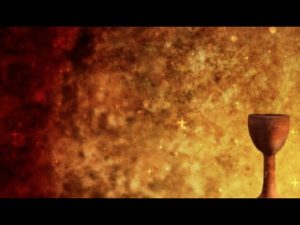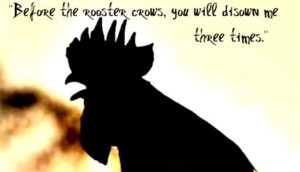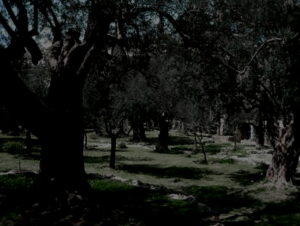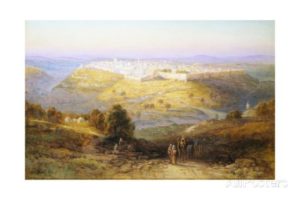Then came the day of Unleavened Bread, on which the Passover lamb had to be sacrificed. So Jesus sent Peter and John, saying, “Go and prepare the Passover for us, that we may eat it.” Luke 22:7-8
The next day was Passover and no plans have been made. Or so it seems. While they are still on the mountain, yawning and stretching, the Master sends Peter and John into the city with instructions to follow a man carrying a jar of water on his head, who would lead them to a house with a room to spare.
Of course, it all falls out as he said. While following the man with the jar, Peter and John glance at each other and smile; such predictions no longer surprise them. They secure the room, a furnished upstairs chamber big enough for all thirteen of them, and spend the rest of the morning at the market. They take particular care with choosing the lamb, as all good Jewish men do, feeling all over for lumps and scars. Finally Peter says, “He’ll do,” and hands over the purchase price. The lamb is led away to slaughter.
The time is drawing near. They can feel it.
The whole city feels it, perhaps—or at any rate, there seems to be more than a Passover hush slowly stealing over it as sunset approaches. A band of turquoise light shimmers on the western hills. Families gather, pilgrims find their furnished rooms, lighted windows blink on in the darkening streets. Familiar scriptures and responses ride the soft wind:
Why is this night unlike other nights?
Youngest sons ask their fathers and fathers give the prescribed answers: hopefully, longingly, routinely, tiredly, as each is inclined. But in some of those houses, at least, there’s a heightened anticipation in the familiar words: the Kingdom is coming. Messiah is here!
In the upstairs room, every required detail of the feast is followed to the letter as the Master takes over the function of family head. Does the youngest disciple ask the questions? Probably, though later they won’t remember the details, even though this meal is the last of the old order. What they will remember is his declaration:
“I’ve longed to eat this meal with you before I suffer. I will not eat it again until it’s fulfilled in the Kingdom.”
They hear “Kingdom” loud and clear. “Fulfilled in the Kingdom” at last! The other part—“before I suffer”—goes over their heads. As usual.
But then he says something truly surprising. Picking up the unleavened bread, made ceremoniously in a kitchen purged of yeast, he says, “This is my body, given for you. Do this in remembrance of me.”
(This is a radical departure from the ritual; what next?)
Picking up his cup, he said, “This is the new covenant, sealed by my blood . . .”
(Blood?)

“. . . and I see the hand of my betrayer on the table. Woe to the man who brings about my predetermined death.”
Judas snatches his hand off the table, his face blazing. How does Jesus know? But of course he would; how had Judas ever imagined otherwise? He casts out demons by the prince of demons, correct? And by the prince of demons he divines the future. Every other hand remains on the table; as the followers stare stupidly at each other. One of them snaps, “Don’t look at me—I wouldn’t do such a thing!” One by one they begin to argue over supposed accusations.
The room is entirely in shadow but for splashes of lamplight. Judas glances toward the head of the table. The Master’s face is turned away. Maybe he doesn’t know who, only what. Anyway, this is as good a time as any, now that the meal is almost done. He made a deal; now it’s time to deliver. In the dark, he slips away.
Meanwhile the argument among the disciples has shifted, as it often does, to determining which of them will be most prominent in the coming kingdom. Matthew touts his administrative skills, Peter sets himself forth as a natural leader, Simon the Zealot cites his experience as a point man, James and John (who have already done some not-so-subtle politicking for places of honor*), quietly lean in on the left and the right,. All, it seem, have an opinion of what will be needed and his unique ability to supply.
“Enough!” The Master slams his cup on the table, cutting off the debate. “You talk like Romans, with all their elaborate authority structures. All of you wish to be masters and lords. Gentiles do that—they lord it over the underlings while pretending to be their benefactors. Listen to me: you shall not be like them.”
The followers maintain a sulky silence as the women come in to clear the table. Swift and silent as shadows, these women have become so familiar as to be almost invisible. They have followed all the way from Galilee, providing food, washing clothes, risking their reputations for the privilege of serving the Master. Mary, and Salome, Joanna—always near, listening, absorbing, anticipating needs before they are spoken. His eyes follow them out of the room.
“So who is the greatest?” he asks: “the one who sits at the head of the table, or the one who serves? Surely, you would say, the one at the head of the table! And yet, my mission is to serve. Don’t worry—you’ve not come all this way with me for nothing. You will receive your kingdom after I receive mine. As we sit around this table now, so I will one day welcome you to a royal throne. In fact—can you see yourselves on twelve thrones, judging the twelve tribes of Israel?”
At this, each man perks up and adjusts his tunic, entertaining the same picture of a great hall—perhaps in Herod’s own palace!–dressed in understated finery while the nation comes before them (including every Pharisee who once looked down his haughty nose and every tax collector who stuffed his purse at their expense).
“But watch out–” the Master says.
Turning his head toward Peter, he speaks in a peculiar tone that doesn’t quite sound like him, “Simon! Simon, you should know that Satan has asked to sift you all like wheat.”
What now? His words have been tugging them like a shifting wind, first one direction and then another. Again they look at each other, each assessing the weaknesses everywhere except in himself, as the Master goes on:
“But I have prayed especially for you, Simon, that your faith may not fail. And when you have recovered, encourage your brothers.”
Ah. Peter figures it out. The Master is in one of his cryptic moods, where he likes to throw things a little off balance to see if they’re paying attention. This is some kind of test, but the response almost makes itself: “Lord, I am ready to follow you anywhere, whether it be to prison—or even to death.”
“Really? The truth is somewhat otherwise: before the rooster crows tonight you will deny, three times, that you even know me.”
Peter’s openmouthed protest doesn’t make it past his lips. Unlike some of his master’s prophesies, This one is uncomfortably specific. Turning to the other disciples, Jesus is now saying, “Remember when I sent you out among the towns last year, and told you to take no provisions? Did you lack anything?”
They shake their heads, recalling the generosity of those households where they brought the god news: “Not a thing.” “They treated us like royalty!” “We received the best every household had to offer.”
”That won’t always be the case from now on,” he replies. “A time is coming when you won’t always be received as heroes. You would do well to provide for yourselves wherever you go—even, if need be, sell your extra cloak to buy a sword.”
Simon the Zealot glances at Thomas. Their eyes light up—finally, the moment has arrived! At a slight nod from his partner, Simon springs to his feet and runs to a corner of the room where their supplies are piled up. Rummaging among his equipment he pulls out something with a metallic clang. “Look, Lord! Two swords, at your service!”
In the darkness it’s hard to judge the Master’s expression, but his voice is full: sadness, hesitation, irony, perhaps even a touch of laughter. “That’s more than sufficient,” he says. “And now it’s time to go.
“It’s time . . .”
_______________________________________
For the original post in this series, go here.
<Previous
Next>







 He’ll need a nest egg to get back home, start a new life. As for the others, well, they’ll have to look out for themselves. They’ll survive. What he’s doing is best for them, too. Really, best for everyone, even the whole nation. Even, perhaps, the Master himself.
He’ll need a nest egg to get back home, start a new life. As for the others, well, they’ll have to look out for themselves. They’ll survive. What he’s doing is best for them, too. Really, best for everyone, even the whole nation. Even, perhaps, the Master himself.


